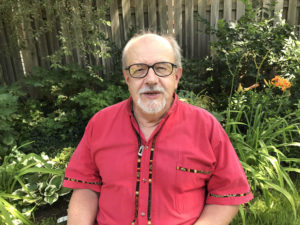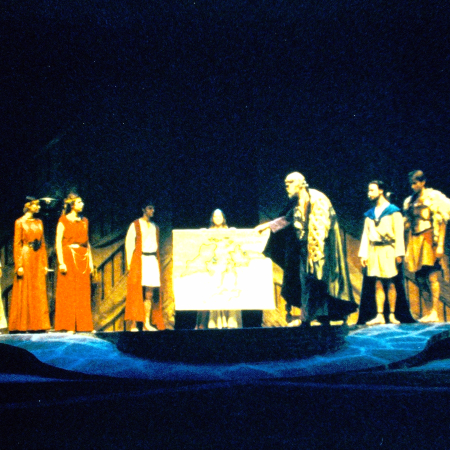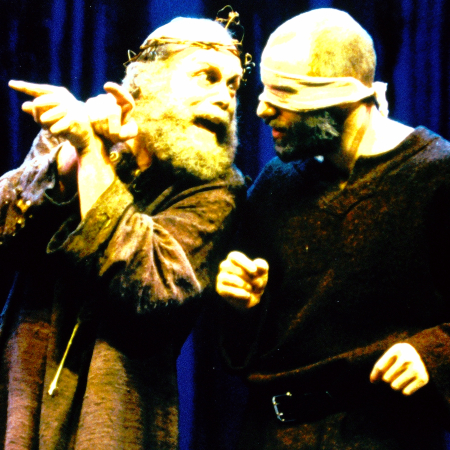 Denis Salter
Denis Salter
Denis joined the Drama and Theatre Division of the English Department at McGill University in the mid-1980s. As a dedicated scholar and teacher, he cared deeply about impeccable research and writing, fostering collaboration and collegiality within and outside of academia–and encouraging students to do the same–supporting local theatre companies in Montreal and across the country, and, above all else, practicing good pedagogy.
More on Denis
Denis loved teaching and was always up for taking on new challenges, even towards the end of his career. He was especially proud of some of the courses he taught during his final years at McGill related to political and Indigenous theatre, informed and enriched by his work with alt.theatre: cultural diversity and the stage magazine over the years, working closely with dear colleagues who, like many others he met through the world of theatre, became lifelong friends. An innovative and caring teacher, he said his last semester of teaching, before retiring in 2021, was especially wonderful, despite Zoom! Shortly before retiring, he had the honour of receiving the Canadian Association for Theatre Research Lifetime Achievement Award for his work on Canadian theatre and “extensive scholarship celebrating the history and character of theatre in Canada”, exploring themes of “multiculturalism and diversity, indigeneity, and gender in both historical and theoretical contexts.”
From Denis' obituary on the CATR website.
Having studied at UBC and the University of Toronto in the 1970s, Dr. Salter witnessed the blossoming of Canadian drama, and he contributed to this “huge cultural epistemological shift” through production reviews, an edited collection of Canadian plays, and extensive scholarship celebrating the history and character of theatre in Canada. In addition to his work on Canadian theatre, Dr. Salter’s scholarship reflects his interest in Shakespeare and Canadian adaptations thereof, as well as concerns of social justice and politics. His articles explore multiculturalism and diversity, indigeneity, and gender in both historical and theoretical contexts.
Dr. Salter has worked with alt.theatre: cultural diversity and the stage since 2006, serving as Editor-in-Chief for several years, where he continues to champion Canadian theatre and scholarship. He is a two-time winner of the Richard Plant Best Essay Prize, and an active contributor to the Canadian Association for Theatre Research. In addition, he sat on the editorial board for Theatre Research in Canada/Recherches théâtrales au Canada for 22 years, from 1993 to 2015.
Over the course of his career, he has explored the cracks and sought the light across a wide range of research interests—teasing out interconnections, and using the security of his position as a tenured academic to advocate for others, to shed light on artists, authors, students, and thinkers whose work might not otherwise be seen or heard.
From the citation for his Lifetime Achievement Award
Tributes
From Professor Erin Hurley:
If Denis was always a pedagogue willing to share his findings, his ruminations, his keywords, his theatrical ephemera, he was also always a student – curious, inventive, resourceful. His incredible teaching and learning in Indigenous drama and theatre that made such a huge – and already much missed – contribution to our department and the Drama & Theatre curriculum is but one example of his example of commitment to social justice in and through theatre and to lifelong learning.
Follow this link for more tributes from colleagues and friends.
Harry Anderson
Harry Anderson taught in the Department of English at McGill from the 1960s until the mid 1990s. He was a cherished and respected colleague. Some of Harry's courses included Medieval Drama Workshop, and Directing for the Theatre. In Medieval Drama Workshop, students would immerse themselves in the production of a medieval play - each student taking part as either an actor, stage manager, designer, or technician. Students were dedicated to him, with good reason.
Harry was a director who valued the script. He took on the classics - The Miser (1986), Doctor Faustus (1986), The Second Shepherd’s Play (1990), The Castle of Perseverance (1994), and finally, King Lear (1995). As a mentor, Harry supported Delia D’Ermo's direction of Gingerbread Lady (1988).
Harry was a great conversationalist, whether it was about a particular work of literature or about his life in the States before he moved to Canada.
Tributes
Sue Williams arrived at McGill in 1974 to do her PhD. She became a lifelong friend of Harry and his family and had this to say about Harry:
The story I heard about how Harry ended up at McGill goes as follows: he and Micky were living in Philadelphia while Harry was doing his PhD at Temple University, and his friend Alan Goldberg got a job offer from McGill, which was hiring a lot of new (and largely American) instructors at that point. Alan said “Why don't you come too? There are jobs for the asking here.” So Harry, Micky, Eric, who was about 10, and three- week-old Alex arrived in Montreal to take up a job in the McGill Department of English department (their third son, Michael, was born a couple of years after that). Harry's office was invariably crowded with people who may or may not have been actually taking his courses, but who wanted to ask his advice about everything from their future careers to their financial problems, how to deal with a difficult landlord or whether to break up with a girlfriend. He could be a stern taskmaster - he didn't suffer lame excuses about missed deadlines, and he consistently pushed his students to undertake things we didn't think we could do. I think his greatest quality as a teacher was his ability to listen. You came away from an advising session with Harry feeling not only that your concerns had been fully considered, but inspired to try the new things he thought you were capable of. It's that warmth and genuine interest in each student as an individual that I remember best about Harry as a teacher.
Angela Alston (B.A., 1991) wrote:
I was a student at McGill in the Department of English, Drama and Theatre option. As a young woman of color, there were not many role models or mentors for me at that time, but when I found myself in Harry Anderson's class in my second year all that changed.
Harry was a joyous man who enjoyed a good debate, a good laugh and saw the potential in many. His office door was always open to me, to discuss my studies, my worries and my ambitions. He encouraged me and showed me that having a creative life had many aspects to it, that you could find a way to express yourself on stage, in print or in conversation. He taught me that no one should ever mask their intelligence, that to question is to learn and that education is a never ending path.
I had the honor of taking numerous classes with Harry, sharing many cups of cocoa in his office (he had a stash in his drawer seemingly waiting for me to enjoy), he never tired of my countless questions or my insecurities, he was critical but fair, supportive and honest - he was by far, the best teacher I have ever had and I was happy that our relationship continued past graduation and that I could call him my friend.
I am confident that many of his students felt the same way - his openness, interest and joy of his work and students was obvious. He was a great talent and his imprint on many will endure.
From Catherine Bradley:
I feel compelled to add my personal recollection of Harry Anderson. It pertains to reverence for the text. Harry directed King Lear in 1995. Often a first meeting with cast and crew is a table reading of the script. Not so in this particular case. Our first meeting with cast and crew was to transfer Harry's script cuts into our paper scripts. The goal, or so I thought, was purely logistical - to cross out enough text to achieve a running time of under three hours.
Each actor, technician, and section head dutifully crossed out the words that Harry read aloud. He read his script cuts in a clear voice with no attempt to impress or perform. He didn't skip anything - he read every word that would be excised from the script - and this went on for a very long time. There was complete concentration during the process. At the end of the session, I told Harry how moving I had found his reading of Shakespeare's words - the ones that our actors would never speak, and our audience never hear.
Harry's answer? "That was exactly the point."
From Professor Paul Yachnin:
I am very sorry to hear this news. My first memory of Harry is from a Department reception when I was a first-year undergraduate. He was talking vehemently with a colleague. I do not remember who. They were arguing about evolution. His interlocutor was a strict Darwinian. Harry was arguing from a lamarckian POV. I didn't know what that was, so I was listening off to the side quietly and intently. Harry was my best introduction to the department because he demonstrated by his boundless intellectual curiosity and collegiality how open the department was to ideas of all kinds. I'm very sad to hear that Harry has left us.
From Professor Dorthy Bray:
I am deeply saddened and moved by this news. Harry was a wonderful colleague; he was kind and supportive to students, yet also to faculty (certainly to this junior faculty member back in the late 90s). Although I didn’t know him well, he made me feel like a friend; my closest encounter was when he was preparing King Lear and he asked me about the early Celtic background to the story (so, surprisingly, I ended up as a casual consultant). He was funny, engaging, and erudite; I respected him highly as a scholar (and a gentleman), and liked him enormously as a person. May his memory be a blessing.



